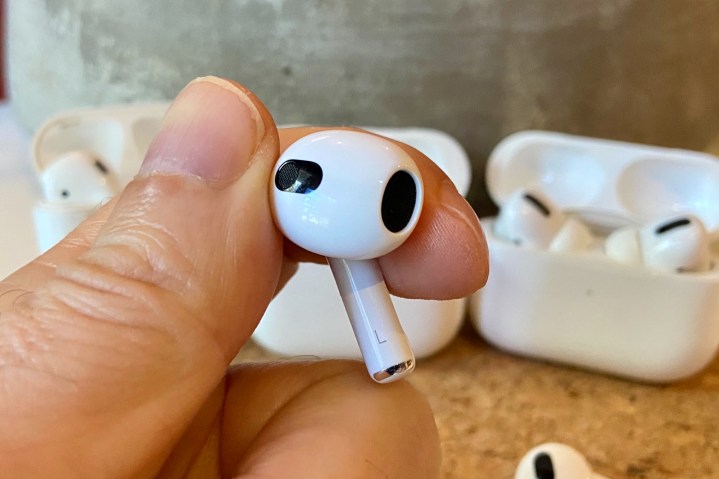
If the many rumors are true, Apple will announce and start selling the next version of its wildly popular AirPods in 2024. While the details remain thin, here’s what we know (and what we think we know) about the fourth-generation Apple AirPods.
AirPods 4?
Let’s start with the obvious: the name. Keep in mind, we’re talking about the successor to the two AirPods models that Apple sells that do not have active noise cancellation—the AirPods 2 and AirPods 3, or AirPods second- and third-gen as Apple prefers to refer to them. In other words, the non-“pro” version of the AirPods.
Apple tends to be a creature of habit when it comes to product names, so there’s every reason to think that the next version will follow the existing AirPods naming convention and be called AirPods fourth-generation. (Apple uses numbers and really the generation bit as a way to differentiate, but you get the idea.)
And since tech publications are also creatures of habit, we and many other outlets will likely refer to them simply as the AirPods 4.
More than one model?
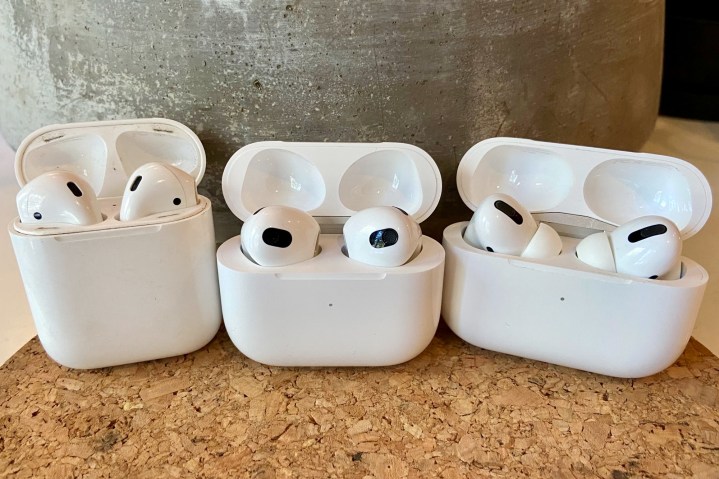
Bloomberg’s Mark Gurman has proven to be one of the most active tech journalists when it comes to covering Apple, and his reporting from 2023 suggested that Apple may decide to release two new AirPods models, not just one.
The reason, it’s believed, has to do with pricing. Apple continues to sell the AirPods 2 (which launched in 2019) for $129, with the regular, Lightning-only charging case. If you want wireless charging, you have to buy the wireless charging case separately for another $79.
Today, from a purely feature-based point of view, this makes the AirPods 2 one of the most expensive sets of wireless earbuds you can buy.
Meanwhile, the $169 AirPods 3 come with a wirelessly charging case, more on-earbuds controls, IPX4 water protection, and is are compatible with Apple’s head-tracked version of spatial audio.
Apple may well decide to replace both the AirPods 2 and AirPods 3 with two versions of the AirPods 4.
Both likely will benefit from an updated design, and you can expect that Apple will tout improvements to sound quality. However, the more expensive version would likely stick with the existing AirPods 3 pricing and offer features like active noise cancellation that edge it closer to what you get with the AirPods Pro 2. It may even get the AirPods Pro 2’s more powerful H2 chip.
The more affordable version could offer a similar experience to the current AirPods 3, but with a price that finally gets a set of Apple-made wireless earbuds closer to (or perhaps a dollar under) the magical $100 price. Apple analyst Ming Kuo said this cheaper model will be known as the AirPods Lite.
Jeff Pu, another Apple analyst, supports the idea that Apple will sell an AirPods Lite model, saying that 2024 is likely to bring reduced demand for Apple’s existing AirPods models.
Apple has had a lot of time to find ways to bring the price of wireless earbuds features down to a more accessible level and still make its famously high profits, and a $100 set of AirPods would likely be a triumph for the company and reverse Pu’s predicted sales downturn.
Samsung, another mobile company that has resisted lowering its wireless earbuds pricing in the past, debuted $100 Samsung Galaxy Buds FE in 2023, and we felt they were an excellent value.
USB-C
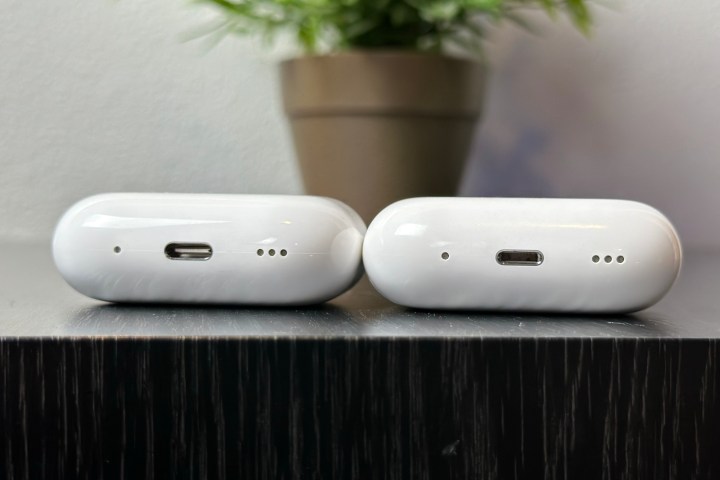
The least surprising prediction about the AirPods 4 is that their charging case (whether or not it also supports MagSafe and wireless charging) will use a USB-C port instead of Apple’s Lightning.
Given that Apple has already made the switch to USB-C on the AirPods Pro 2 and on its most recent iPhone (largely due to an E.U. regulation that essentially forced the move), it seems 99% certain that USB-C will become the norm for all AirPods models — including the second-gen AirPods Max, which is also expected to debut in 2024.
USB-C not only simplifies the variety and number of cables you need to keep on hand — it also enables iPhone-based charging of your AirPods if you have a USB-C-equipped iPhone like the iPhone 15. (Or any other modern phone, for that matter.)
At least one of the new AirPods 4 models (probably the pricier one) is also expected to inherit the AirPods Pro 2’s Find My feature, complete with the built-in speaker.
Health and more
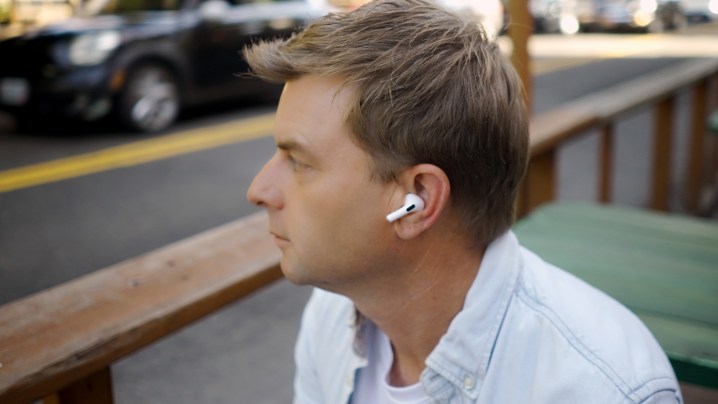
The murkiest predictions for the AirPods 4 center around possible new sensors and health tracking. Gurman has said that temperature sensors added to the AirPods would give Apple’s other products, like the Apple Watch and the Apple Health app in iOS, greater accuracy when gauging your body’s state. Small fluctuations could prove useful when providing early detection of illness.
It’s also expected that Apple will continue to look for ways to improve hearing. A new test within iOS might serve as an alternative to an audiologist visit, giving the AirPods 4 the ability to act as a hearing aid. New regulations have changed the landscape for over-the-counter (OTC) hearing aids in the U.S., and Apple wouldn’t be the first non-medical device company to look at ways to enter this growing market.
The same test could also offer benefits for casual music listening. Many companies now ship wireless earbuds with built-in support for software that compensates for each person’s unique frequency sensitivity. This creates a custom EQ preset that enhances portions of the audible spectrum that may be harder for some to hear.
Announcement and availability
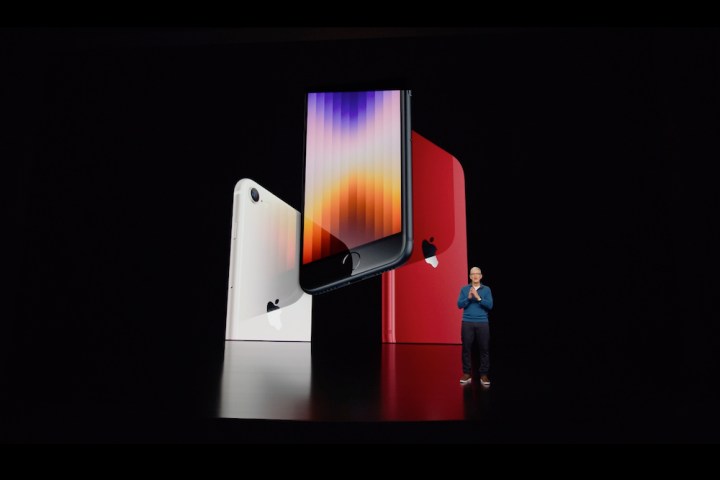
Given that it’s now April, the window of time before Apple’s next scheduled event — the 2024 WorldWide Developer Conference (WWDC), which is slated for June 10-14 — is closing fast. This makes it unlikely that Apple will formally announce the next AirPods until that event, at the earliest.
However, if history is any guide, Apple is much more likely to wait until September. New AirPods models have traditionally been announced alongside new iPhone models, and these have always received fall debuts, whereas WWDC has typically been reserved for discussions of new software features powered by iOS.
If a September announcement is indeed in the cards, you can expect that the AirPods 4 will be made available shortly thereafter as Apple ramps up production capacity to meet the all-important 2024 holiday season.
Editors’ Recommendations

